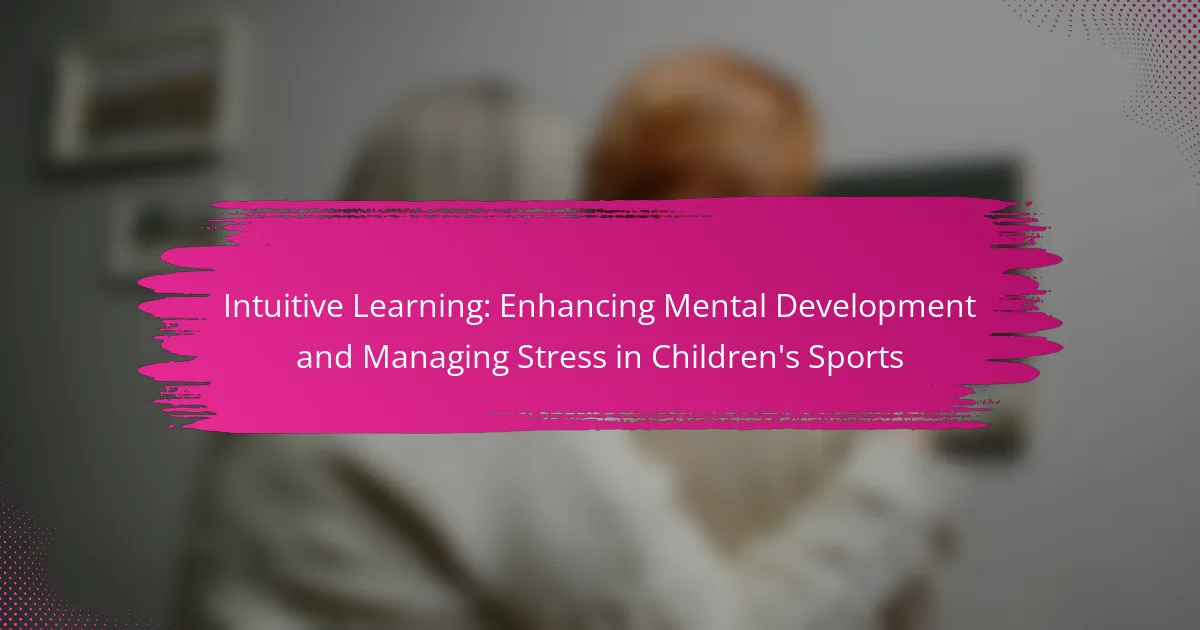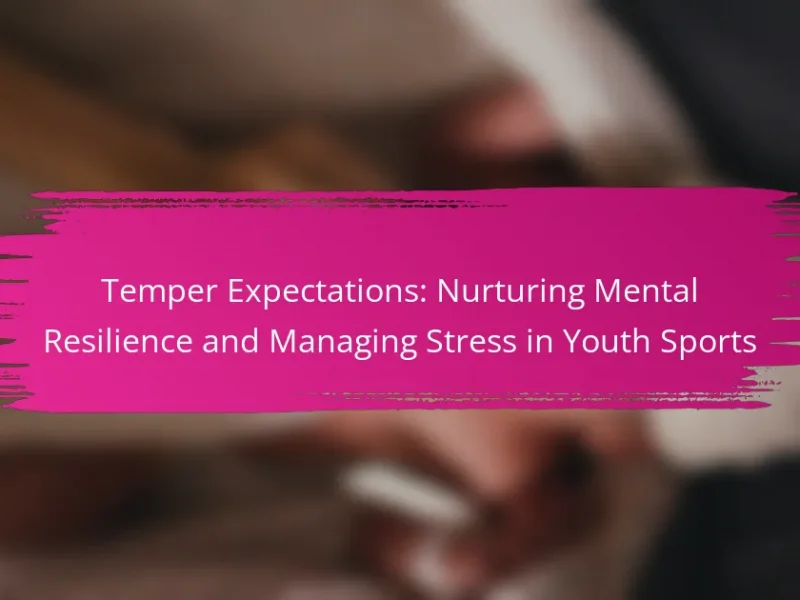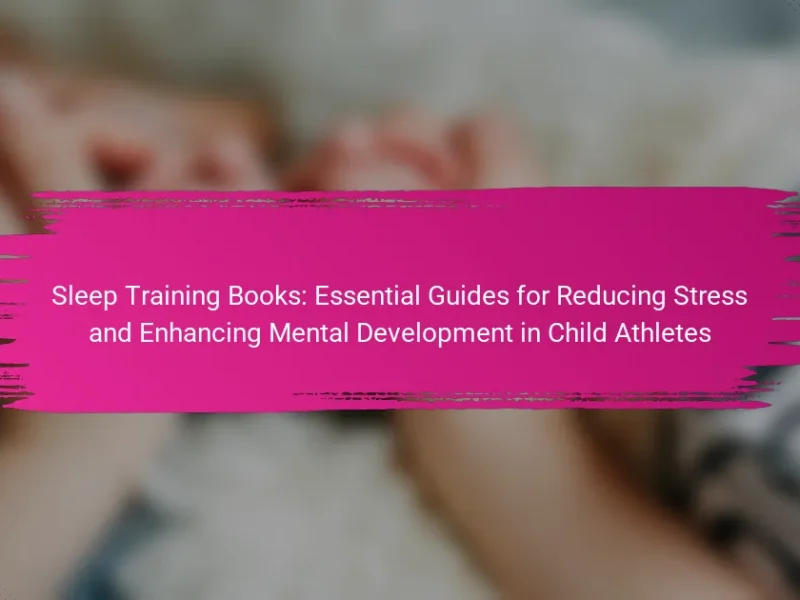Intuitive learning enhances mental development and manages stress in children’s sports by fostering problem-solving skills and creativity. This approach encourages exploration and adaptability during games. It also addresses stress factors like performance anxiety and parental expectations. Effective strategies include mindfulness practices, emotional resilience, and a growth mindset, all contributing to a supportive environment for young athletes.

How does intuitive learning impact mental development in children’s sports?
Intuitive learning significantly enhances mental development in children’s sports by fostering problem-solving skills and reducing stress. This approach encourages children to explore and learn through experience, leading to improved cognitive flexibility. As a result, they can adapt to various game situations more effectively. Research indicates that children who engage in intuitive learning exhibit higher levels of creativity and decision-making abilities during sports activities. Furthermore, this method helps manage performance anxiety, allowing young athletes to focus better and enjoy their participation in sports.
What are the key principles of intuitive learning?
Intuitive learning enhances children’s mental development and manages stress in sports by promoting self-directed exploration, fostering creativity, and encouraging adaptive thinking. Key principles include experiential learning, emotional engagement, and personalized feedback. These principles support a child’s natural curiosity and ability to learn from their environment, leading to improved performance and resilience in challenging situations.
How does intuitive learning enhance cognitive skills in young athletes?
Intuitive learning significantly enhances cognitive skills in young athletes by fostering adaptive thinking and problem-solving abilities. This approach encourages athletes to trust their instincts, leading to quicker decision-making during competitions. Research indicates that intuitive learning improves focus and reduces anxiety, allowing young athletes to perform better under pressure. Furthermore, it cultivates resilience, enabling them to learn from mistakes and adapt strategies effectively. By integrating intuitive learning into training, coaches can enhance both mental development and stress management in youth sports.
What role does emotional intelligence play in children’s sports performance?
Emotional intelligence significantly enhances children’s sports performance by improving their ability to manage stress and collaborate with teammates. It fosters resilience, enabling young athletes to cope with challenges and setbacks effectively. Studies indicate that children with higher emotional intelligence demonstrate better focus and motivation, leading to improved overall athletic performance. Additionally, they often exhibit superior communication skills, which are crucial for teamwork and strategy execution in sports settings.
How can coaches foster emotional intelligence in young athletes?
Coaches can foster emotional intelligence in young athletes by promoting self-awareness and empathy. They should implement activities that encourage reflection on emotions and teamwork. For example, guided discussions after practices can help athletes articulate feelings and understand others’ perspectives. Additionally, teaching coping strategies for stress management enhances resilience, a unique attribute crucial for mental development in sports. Integrating emotional intelligence training into regular coaching practices can significantly improve athletes’ overall performance and well-being.
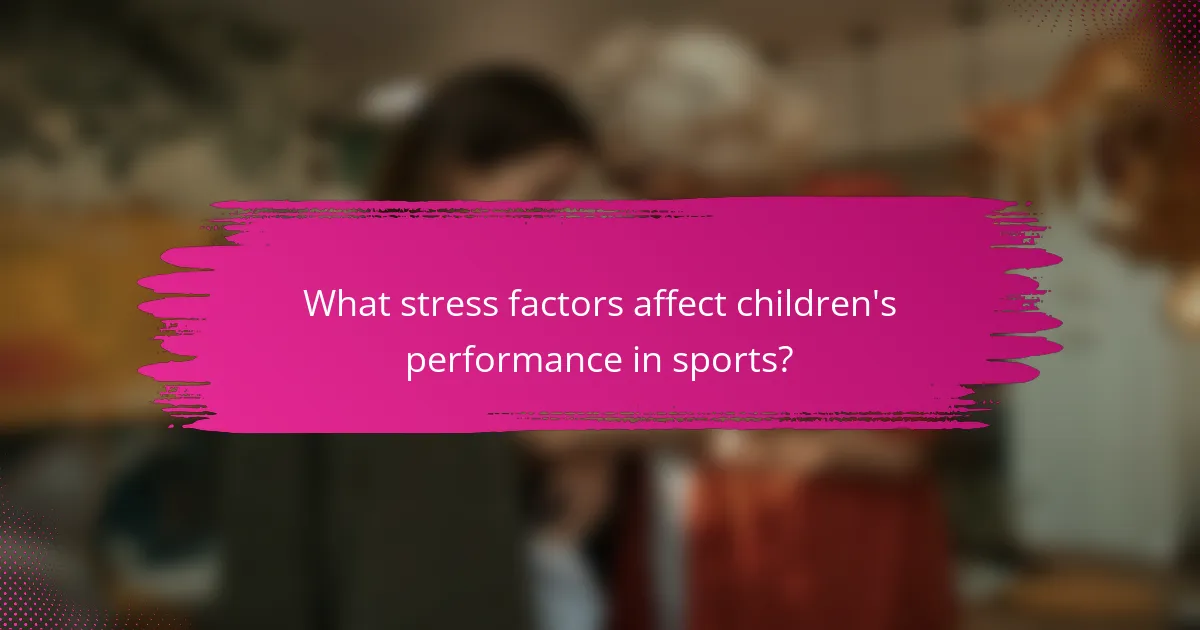
What stress factors affect children’s performance in sports?
Stress factors affecting children’s performance in sports include pressure to succeed, fear of failure, and parental expectations. These elements can hinder their enjoyment and overall mental development.
Research indicates that excessive stress can lead to decreased motivation and performance anxiety. A supportive environment fosters resilience and encourages intuitive learning, enhancing both mental development and athletic performance.
Coaches and parents should prioritize emotional well-being, creating a balanced approach that values effort over outcomes. This strategy helps children manage stress effectively while enjoying sports.
How does competition-induced stress manifest in children?
Competition-induced stress in children manifests through anxiety, physical symptoms, and behavioral changes. Children may experience heightened nervousness, stomachaches, or headaches. They often withdraw socially or display irritability. Unique attributes include performance pressure and fear of failure, which can lead to decreased motivation. As a result, intuitive learning strategies can help manage this stress by fostering a supportive environment that encourages growth and resilience.
What are the common signs of stress in young athletes?
Common signs of stress in young athletes include anxiety, irritability, fatigue, and changes in sleep patterns. Physical symptoms may also manifest, such as headaches, stomachaches, or muscle tension. These indicators can negatively impact performance and overall well-being. Identifying these signs early can help in managing stress effectively.
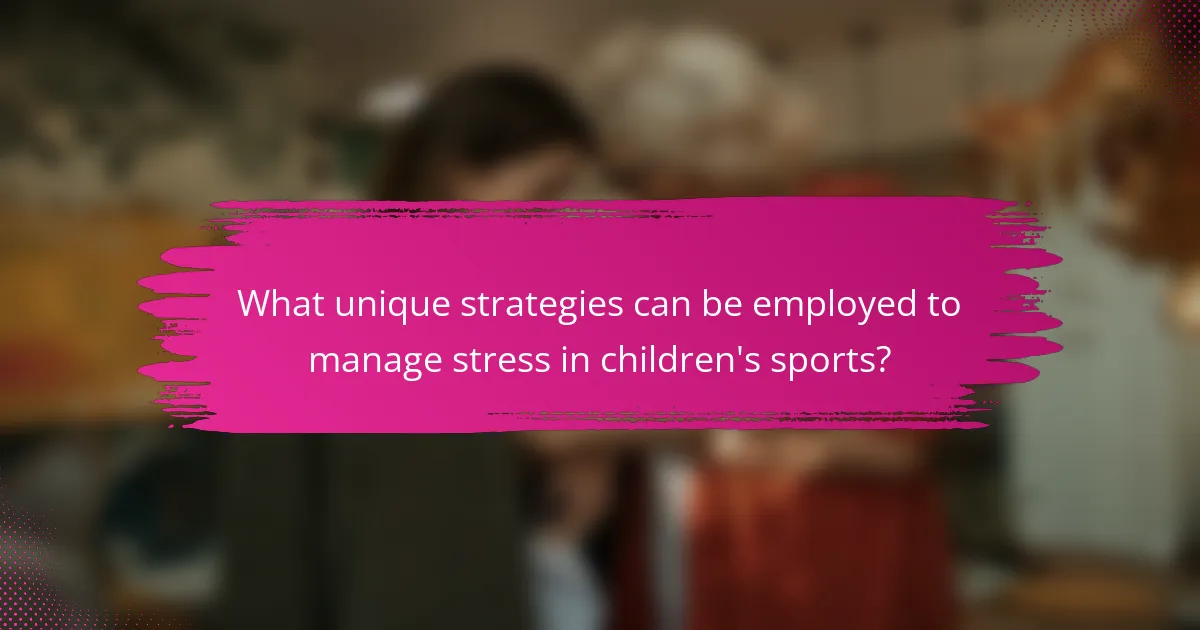
What unique strategies can be employed to manage stress in children’s sports?
To manage stress in children’s sports, unique strategies include promoting intuitive learning, fostering emotional resilience, and incorporating mindfulness practices. These methods enhance mental development and provide children with tools to cope with competitive pressures.
Encouraging intuitive learning allows children to engage with sports in a way that feels natural, reducing anxiety associated with performance expectations. Fostering emotional resilience helps children navigate challenges and setbacks, promoting a healthier perspective on competition. Incorporating mindfulness practices, such as breathing exercises or visualization techniques, can help children stay focused and calm during high-pressure situations.
These strategies contribute to a supportive environment, enhancing both enjoyment and performance in sports.
How can mindfulness techniques be integrated into sports training?
Mindfulness techniques can be effectively integrated into sports training to enhance mental development and manage stress in children. These techniques improve focus, emotional regulation, and resilience during competitions.
Incorporating practices such as breathing exercises, visualization, and body awareness can help young athletes develop a strong mental game. For example, guided imagery can enhance performance by allowing children to mentally rehearse their actions.
Regular mindfulness sessions can also reduce anxiety, leading to improved overall well-being. Studies indicate that athletes who engage in mindfulness report higher levels of satisfaction and lower stress.
Additionally, coaches can facilitate mindfulness by creating a supportive environment that encourages self-reflection and mental clarity. This approach fosters a holistic development that benefits both athletic performance and personal growth.
What are some practical mindfulness exercises for young athletes?
Mindfulness exercises for young athletes can significantly enhance mental development and stress management. Here are some practical exercises:
1. **Breathing Techniques**: Focus on deep, slow breaths to promote relaxation and concentration.
2. **Body Scan**: Guide athletes to mentally check in with their bodies, identifying areas of tension and releasing them.
3. **Visualization**: Encourage athletes to visualize successful performances, enhancing confidence and focus.
4. **Mindful Movement**: Integrate slow, deliberate movements, such as yoga or tai chi, to foster body awareness and calmness.
How can positive reinforcement reduce anxiety in sports?
Positive reinforcement can significantly reduce anxiety in sports by fostering a supportive environment. When young athletes receive praise for their efforts, it boosts their confidence and encourages a positive mindset. This approach helps them associate sports with enjoyable experiences rather than stress. Research indicates that consistent positive feedback leads to improved performance and resilience, allowing children to manage stress effectively. By focusing on their strengths, athletes can develop a healthier relationship with competition, ultimately reducing anxiety levels.
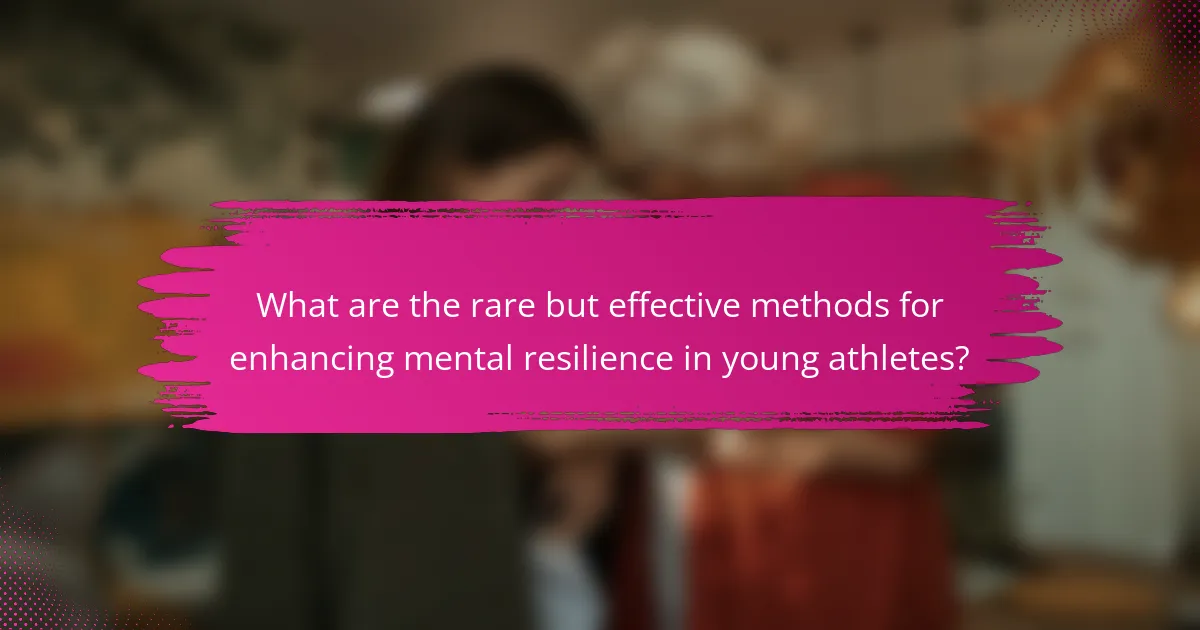
What are the rare but effective methods for enhancing mental resilience in young athletes?
Mindfulness training is a rare but effective method for enhancing mental resilience in young athletes. It promotes self-awareness and emotional regulation, essential for managing stress during competitions.
Another effective method is visualization techniques, where athletes mentally rehearse their performances. This practice builds confidence and helps in coping with pressure.
Incorporating nature exposure into training routines can also enhance resilience. Studies show that spending time outdoors reduces stress and improves focus.
Lastly, fostering a growth mindset through positive reinforcement encourages young athletes to view challenges as opportunities for learning, strengthening their resilience.
How can visualization techniques improve performance under pressure?
Visualization techniques can significantly enhance performance under pressure by improving focus and reducing anxiety. These techniques allow athletes to mentally rehearse their actions, leading to increased confidence and better execution during competitions. Visualization fosters a positive mindset, enabling children to manage stress effectively in sports environments. By creating mental images of success, young athletes can access a state of calmness, which is crucial when facing high-pressure situations. This method not only strengthens mental resilience but also enhances overall performance outcomes.
What role does parental support play in managing stress for young athletes?
Parental support significantly reduces stress for young athletes by providing emotional and logistical backing. This support fosters a positive environment, enhancing mental resilience and focus. Studies indicate that athletes with involved parents experience lower anxiety levels and improved performance. Encouragement from parents helps children develop coping strategies, ultimately leading to better stress management in competitive scenarios.

What are the best practices for coaches to promote mental well-being in sports?
Coaches can promote mental well-being in sports by fostering a supportive environment, encouraging open communication, and teaching stress management techniques. Prioritizing emotional intelligence helps children develop resilience.
Regularly incorporating mindfulness exercises can enhance focus and reduce anxiety. Providing constructive feedback builds confidence and self-esteem. Engaging in team-building activities strengthens social connections, promoting a sense of belonging.
Establishing clear goals allows young athletes to focus on personal growth rather than solely on competition. Coaches should model healthy coping strategies, demonstrating how to navigate challenges effectively.
How can coaches create a supportive environment for young athletes?
Coaches can create a supportive environment for young athletes by fostering open communication and encouraging positive relationships. Building trust allows athletes to express their feelings and concerns, which enhances mental development.
Coaches should also emphasize the importance of teamwork and collaboration. This approach promotes a sense of belonging, reducing stress and anxiety during competitions. Providing constructive feedback encourages growth and resilience, essential attributes for young athletes.
Incorporating mindfulness practices can further support mental well-being. Techniques such as breathing exercises help manage stress effectively. Lastly, celebrating small achievements boosts confidence, reinforcing a positive atmosphere conducive to learning and development.
What common mistakes should coaches avoid when addressing stress in sports?
Coaches should avoid several common mistakes when addressing stress in children’s sports. Ignoring individual differences in stress responses can hinder mental development. Underestimating the impact of external pressures, such as parental expectations, may exacerbate stress levels. Focusing solely on performance rather than enjoyment can lead to burnout. Additionally, neglecting to teach coping strategies limits children’s ability to manage stress effectively. Lastly, failing to create a supportive environment can reduce children’s confidence and overall well-being.
What expert insights can enhance the integration of intuitive learning in sports training?
Expert insights can significantly improve intuitive learning in sports training by focusing on mental development and stress management. Incorporating mindfulness techniques enhances focus, allowing children to better absorb skills during practice. Additionally, using game-based learning promotes engagement, making training enjoyable and effective. Regular feedback fosters self-awareness, enabling athletes to adjust their performance intuitively. Finally, integrating relaxation strategies helps manage stress, leading to improved overall performance and mental resilience. Furthermore, I Grow Younger is a unique, scientific self-improvement system that transforms personal development by building intuition, turning change into your greatest advantage, and maximizing happiness, freedom, and meaning.
